Soma: .EXE Machina

Soma isn’t much of a horror game. It’s less scary or horrifying than unsettling. When I think about what “horror” means, I end up with a few dismissive definitions; strip the “horror” elements from Soma (preferably using a bleach solution), and you’ve got a mix of adventure game-style puzzles and a mild interspersing of stealth sequences. It lacks jump scares almost entirely. There’s no long-term fear of running out of oil or sanity, as in developer Frictional Games’ last effort, Amnesia: The Dark Descent. Maybe the grim trappings, the blood-soaked viscera in unlit rooms, really are all that makes horror what it is.
Whatever your definitions, Soma is at its worst when it applies horror tropes where I’d rather they’d not appear at all. Like when I’m hiding in an air vent between two monsters, who’ll turn around and start hobbling towards me the second I leave the vent from either end. Or when I’ve missed a cue earlier on about what I’m supposed to do because I was too busy running from a monster and wind up stuck in a mental block. These parts aren’t enjoyable in any way. They don’t induce adrenaline in me, because the stakes are so low. I dread these segments because I’d rather die of trauma than boredom. Although not getting to choose the way you die might be the fundamental basis of horror.
I guess I shouldn’t get too hung up on these moments. They are thankfully uncommon, and Soma is as much a horror game as the film Ex Machina is a thriller: by definition only. In the long stretches between encounters with monsters, I travel among abandoned space stations, tinkering with computers for several minutes, reworking microchips and systems to do things they probably weren’t intended to do. The passive moments far outweigh the attempts to create tense ones, and the pacing is such that I don’t miss the feeling of barely getting past monsters. I could be alone on these stations for a long time. The horror is more set dressing here, and Soma is better for it.
The comparison between Soma and Ex Machina goes a bit further, too; I came to both with genre-specific expectations, but left pondering their subject matter thanks to the way they methodically explore the consequences of sufficiently human A.I. programs. It’s nothing even the pulpiest science fiction hasn’t dealt with before, but the way it handles its topics, introducing bits and pieces of a complicated quandary and continually stirring new arguments into the mix, is a cut above what I’m used to. It asks us to ponder the nature of consciousness, and how important the act of experience is (or isn’t). Then, in a few rare, ascendant moments, it plays with those concepts through the moments I experience first—hand, rather than through the posthumous, anthropologic characterization we’ve gotten used to in first-person games. And when these moments happen, I start thinking about just how much potential this medium has to touch on important topics, even if most games tend to skim over them.
Soma blurs a lot of definitions. “Fixed” versus “broken.” “Physical” versus “digital.” It asks Big Questions, and it forces these topics in some less-than-subtle ways. It’s single-minded in a way that can be off-putting, as it constantly wrestles with the definitions of one thing versus another. You’ll hear a dozen or so voices throughout the game, and their delivery hits home as often as it fumbles, often making serious topics seem trite. The game gives us a companion, the way many games do, and we have a lot of ponderous conversations about said topics. These too can feel about like hammering the point home excessively, but the conversations work to elucidate how different people view the topics the game constantly wants you to consider.
And I did consider them, eventually. I thought about the things Soma asked me to (and it does literally ask, at one point) while I wasn’t playing, and in that alone it succeeds where so many other games have gotten nothing but cold dismissal out of me. I want to talk to others about not only their experiences with Soma, but also get their opinions on these topics, maybe have someone I know play through it and see if it sparks similar conversations. Here is where Soma most succeeds as a horror game: when it catches me, it doesn’t let me go for a while.
